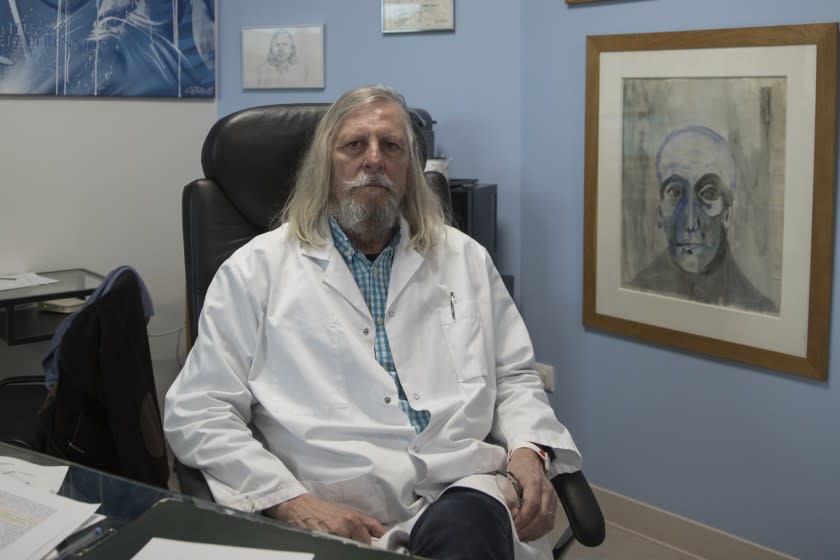Column: Study concludes chloroquine drugs promoted by Trump are worthless against coronavirus

The most eagerly anticipated study on the effect of antimalarial drugs — the drugs assiduously promoted by President Trump — on COVID-19 finds that they're worthless against the disease caused by the coronavirus.
The results from a trial of 821 non-hospitalized subjects who had been exposed to the virus by someone living in their household or as a healthcare worker or first responder were released Wednesday by researchers at the University of Minnesota who led the trial.
The results are due to be published later Wednesday in the New England Journal of Medicine.
While we are disappointed that this did not prevent COVID-19, we are pleased that we were able to provide a conclusive answer.
David Boulware, University of Minnesota
The key finding is that hydroxychloroquine, the most common preparation of drugs typically used to prevent malaria and to help those with autoimmune conditions such as lupus and rheumatoid arthritis, "was not able to prevent the development of COVID-19 any better than a placebo."
Moreover, the researchers reported, 40% of the trial participants taking the drug developed side effects including nausea, upset stomach or diarrhea. The researchers termed these effects "non-serious."
They said, however, that they found no evidence of cardiac complications — a leading fear among medical experts who cautioned against casually prescribing hydroxychloroquine, especially when administered together with certain antibiotics.
"Our objective was to answer the question of whether hydroxychloroquine worked to prevent disease or did not work,” said David Boulware, the lead researcher at the University of Minnesota. “While we are disappointed that this did not prevent COVID-19, we are pleased that we were able to provide a conclusive answer."
The study should help end the craze for chloroquine and hydroxychloroquine as preventive drugs or treatments for COVID-19, the pandemic disease caused by the novel coronavirus.
The most prominent promoter of the antimalarials as nostrums against the coronavirus has been Trump, who talked them up as potential "game changers" starting in March. More recently, he said he had been taking hydroxychloroquine as a preventive himself, though that claim could not be verified.
The lead originator of the theory that the antimalarials were effective against the virus was Didier Raoult, a prominent French epidemiologist. Raoult's research, however, has been widely criticized as sloppy and inconclusive. Nevertheless, it was taken up by Trump and cited by Dr. Mehmet Oz, whose television program is followed by millions of U.S. viewers even though its claims for medical advances have often been questioned by the scientific establishment.
Evidently at Trump's urging, government agencies stockpiled hydroxychloroquine, and the Food and Drug Administration issued a rare emergency-use authorization that effectively overrode doctors' doubts about the preparation. The FDA subsequently cautioned against the use of hydroxychloroquine or chloroquine for COVID-19 because of cardiac risks.
The drugs were eagerly sought by doctors and laypeople desperate for prevention or treatment for a disease whose symptoms and deadliness are still not entirely understood by medical experts.
Meanwhile, patients needing the drug for legitimate uses against lupus and other diseases ran into shortages because of its diversion to coronavirus treatment.
Over time, some medical centers that had incorporated the drugs into their standard treatments for COVID-19 patients abandoned them, generally concluding that they were ineffective and therefore not worth the risk of side effects such as heart problems.
A recent study that purported to find an increased risk of cardiac problems among patients taking hydroxychloroqiuine or chloroquine, as it happens, has been questioned by hundreds of researchers, in part due to doubts about the private database of 96,000 patients worldwide used in the study.
The Lancet, the British medical journal that published the paper, has attached an "expression of concern" to the study, which may be a precursor to its retraction. The New England Journal of Medicine has tagged a related study with its own "expression of concern."
Those doubts aren't relevant to the Minnesota study, in which half of the 821 participants received a five-day treatment with hydroxychloroquine and half received five days of a vitamin pill as a placebo. The trial was double-blinded, meaning that neither the subjects nor the researchers knew which treatment they were receiving.
The subjects were followed for two weeks to see if they developed symptoms of COVID-19.
"Approximately 12% of those given hydroxychloroquine developed COVID-19 versus approximately 14% given the vitamin placebo," the researchers reported. The difference was not statistically significant.
"Even if there was a statistical difference," the researchers wrote, "this would equate to treating 42 persons with hydroxychloroquine in order to prevent one infection."
They said there" was no further benefit to prevent infection among those who also took zinc or vitamin C," which are commonly paired with the antimalarials.
